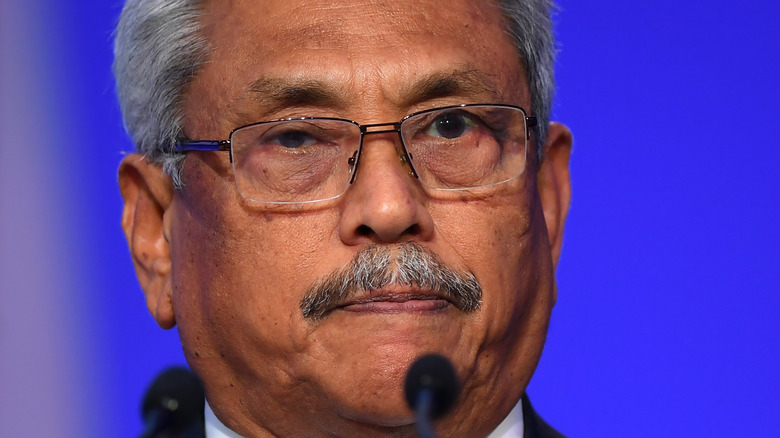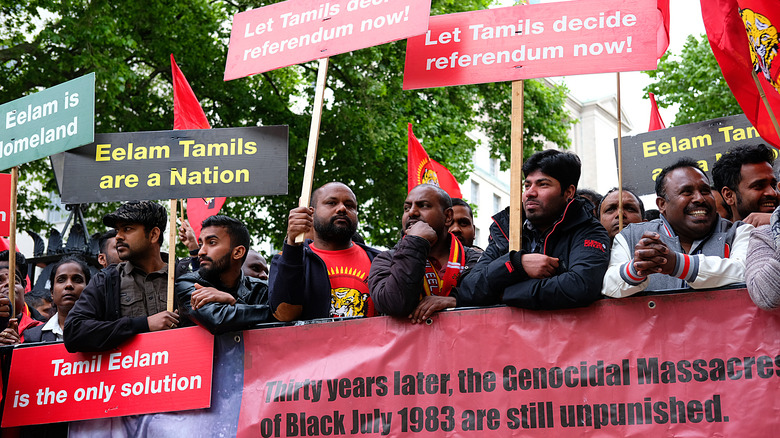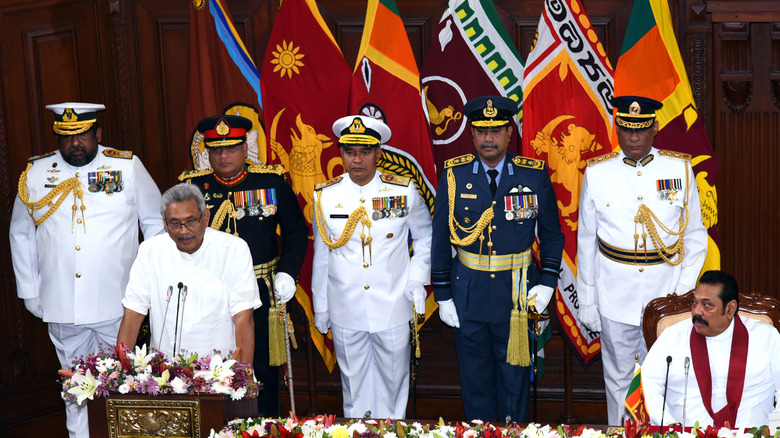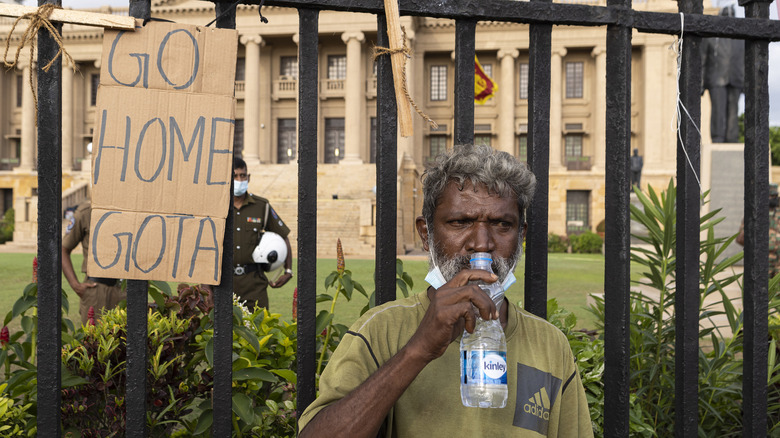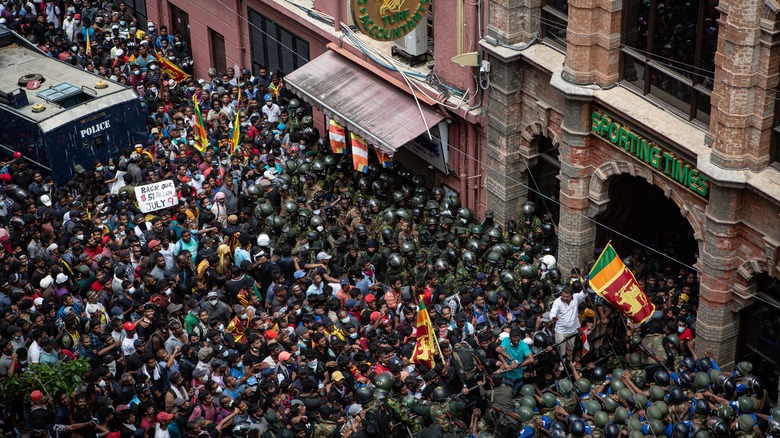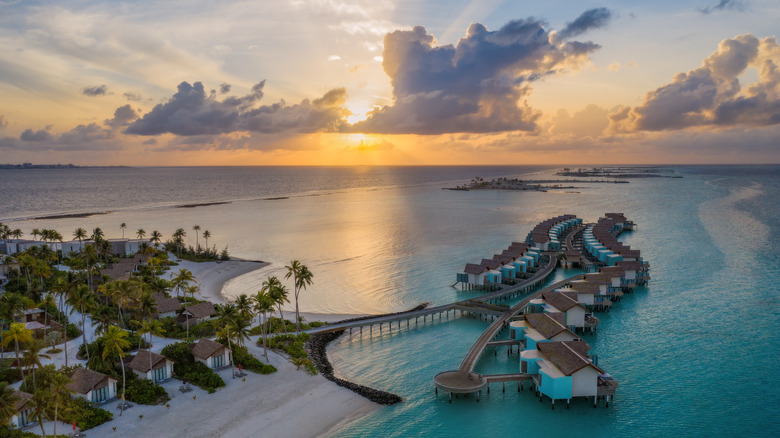Who Is Gotabaya Rajapaksa, The Ousted President Of Sri Lanka?
It's a story as familiar as it is horrific and exasperating: An individual or group of individuals comes to power during a fractious era of a nation's history, promises change, a brighter future, and then in the span of a generation abuses that trust and destroys a nation. Think the Lenin-led Bolshevik Revolution in czarist Russia in 1917, a revolution for the people, by the people that by 1924 saw murderous Soviet dictator Joseph Stalin come to power (via History). Think the glory-seeking rise of the Germany's National Socialist German Worker's (Nazi) party following Germany's humiliating 1918 defeat in World War I (also via History). Think Mao Zedong, the folk champion who in his "Great Leap Forward" from 1958 to 1962 murdered up to 45 million of his own citizens (via The Washington Post).
Granted, Sri Lankan president Gotabaya Rajapaksa isn't a world-shaking madman along the lines of history's worst tyrants. But, as CNN outlines, all the hallmarks of the same story are there. Sri Lanka passed through a 26-year civil war from 1983 to 2009 between the Tamil people along the nation's north and east coast, who wanted independence, and the ruling party, as Nationalia chronicles. Some 3.3 million citizens were beaten back, 300,000 were displaced from their homes, and around 40,000 civilians were killed. Then, Sri Lankan President Mahinda Rajapaksa was decreed a war hero. And now, after years of governmental abuse and mismanagement, his brother Gotabaya — the current president — has been forced to flee the country.
A 26-year Sri Lankan Civil War
Sri Lanka has a long, deep, 2,500-year-old recorded history that goes far in explaining the events of the present as they relate to Gotabaya Rajapaksa. Buddhism was introduced into Sri Lanka, a small island nation off the southern Indian coast, by the mid-third century BCE, as the Sri Lankan Embassy in Germany writes. Sri Lanka was an independent kingship until then, and experienced a period of prosperity afterwards. Come the 10th century CE, Anuradhapura — the original name for Sri Lanka — was taken over by conquerors from the Indian mainland, who were largely Hindu. The Portuguese arrived in 1505 and ruled until 1656, when the Dutch took over. In 1815 the British took over from them, renamed the island Ceylon, and it was only in 1948 that the modern nation of Sri Lanka gained its independence. The name "Sri Lanka" didn't exist until 1972.
A mere 11 years after Sri Lanka got its current name, its civil war began. Come 1983, as Nationalia explains, people of the Hindu Tamil ethnic group wanted freedom from the Buddhist-majority Sinhala Sri Lankans who make up most of the country's 22 million citizens. Tamil Eelam, the area of land encircling the northeastern rim of the island — as seen on Tamil Nation — stood behind the Liberation Tigers of Tamil Eelam (LTTE), a paramilitary organization who squared off against the Sri Lankan army, and country's legitimate government. It took until 2009 for them to finally lose.
The rise of the Rajapaksa brothers
To people in Tamil Eelam, the Liberation Tigers of the civil war were freedom fighters and heroes. To the Sri Lankan Sinhala majority, they were terrorists and murderers. In 2005, this majority got their wished-for "war hero" and "appachchi" — father of the nation — in Mahinda Rajapaksa, as CNN describes. Rajapaska became president four years before the war ended in 2009. He became a near-mythical figure, all but worshiped as herald of a unified, renewed Sri Lanka. When he walked by, people bowed. When he got sick, people worried. His health and power were the health and power of the nation.
As in many such tales, Sri Lanka's new, glorious leader proved susceptible to corruption. Mahinda ran the government "like a family business." One brother, Basil, became Minister of Economic Development. Another brother, Chamal, became Speaker of Parliament. Yet another brother, Gotabaya, became Defense Secretary — the same Gotabaya who recently fled the country on July 13, 2022, as sitting president.
The tremendous wealth that Mahinda amassed as president came from his ongoing "borrowing spree." By 2015, Sri Lanka owed China $8 billion. While the economy looked on the up-and-up from the outside, it rotted from within. Some criticized the government (and family, therefore) for nepotism and greed, and others accused them of controlling the media (via CNN). But because "peace" had been achieved — or at least the lack of open conflict — many citizens were content to just let things be.
A country in economic freefall
Even as far back as 2011, there were cracks in the surface of Sri Lanka's post-civil war veneer. Back then, according to a 2014 CNN report, the United Nations' Human Rights Council passed a resolution calling for an investigation into human rights' abuses during the Sir Lankan civil war, on both sides. Among the abuses were the "intentional shelling of civilians, summary executions, rape, and blocking food and medicine from reaching affected communities." As the war wound to a close, as many as 40,000 Tamil civilians may have been murdered. Mahinda Rajapaksa denied all such statements even as opponents accused him of giving quiet approval to extremist Buddhist groups to spread terror among Tamil communities.
Come 2022, the situation in Sri Lanka — particularly Mahinda's overspending and the country's rising debt — came to an inevitable head. From January to May, inflation rose over 50%, as the BBC reports. There have been widespread power cuts throughout the country. A lack of medicine has brought its healthcare system to collapse. There isn't enough foreign currency to import fuel, which has caused fuel prices to skyrocket. Schools have completely shut down. In May, Sri Lanka failed to pay back its interest on foreign loans for the first time. That same month, Mahinda Rajapaksa resigned from his new position as prime minster, which he'd adopted in 2020.
The year prior, in 2019, Mahinda's brother and former Defense Secretary, Gotabaya, became president. He inherited a dying horse that's now all but dead.
Storming the house of the president
When Gotabaya Rajapaksa became president in 2019, he merely continued the same policies as his predecessor and brother, and also "saw governing as a family affair," as CNN says. That same year an Islamic militant terrorist attack had driven the Sri Lankan public to rally around its the Rajapaska family. When Mahinda was elected prime minister the following year in 2020, he said, "People have once again imposed their full confidence in us. We will fulfill their aspirations and will always value the confidence they have placed in us." Less than two years later, Gotabaya and Mahinda's mismanagement of the Sri Lankan government and economy has crippled their nation.
On April 1, 2022, as CNN describes, Gotabaya declared a state of emergency, which included blocking social media and allowing authorities to detain people without warrants. This didn't exactly go over well, because on July 13 citizens of Sri Lanka's capitol, Colombo, stormed Gotabaya's personal residence in rage and desperation (seen above). Even at the time of this writing, the military hasn't regained control of the residence, and demonstrators are "still swimming in the presidential pool, singing in the presidential dining room and dancing around the opulent presidential grounds." Another CNN report quotes Ganeshan Wignaraja, senior research associate at the British think tank ODI Global, who said, "You have this idea that the ruling elite are living very lavishly, while being very corrupt, and the ordinary person is in grave difficulty."
Fugitive president
President Gotabaya Rajapaksa fled his home mere minutes before Sri Lankans "broke the compound's first barrier," as CNN reports. The Sri Lankan military escorted Gotabaya to a military plane that flew directly to the Maldives, a tourist-heavy destination composed of a chain of tropical islands to the southwest of Sri Lanka (pictured above). By all accounts, the Maldivian government refused Rajapaska's plane the right to land until former Maldivian President Mohamed Nasheed convinced the Maldivian parliament otherwise. As The Hindu notes, Nasheed has ties to current Sri Lankan Prime Minister Ranil Wickremesinghe, who took over for Mahinda Rajapaksa after he resigned in May.
Gotabaya, who hasn't resigned, has made Wickremesinghe acting president in his absence. To become president, Wickremesinghe had to temporarily step down from his role as prime minister, saying on Twitter that he would "ensure the continuation of the government including the safety of all citizens." Parliamentary speaker Mahinda Yapa Abeywardena has been designated acting prime minister, in turn. As the BBC reports, Wickremesinghe has told the Sri Lankan military to do "whatever is necessary to restore order." He also stated, "We can't tear up our constitution. We can't allow fascists to take over. We must end this fascist threat to democracy."
One demonstrator, Nixon Chandranathan, said, "Our goal is for Gota[baya] to go home. And Ranil [Wickremesinghe] and other cabinet members to go home. We need truthful and honest leaders to build up Sri Lanka now." Until then, Gotabaya remains hidden in the Maldives.
